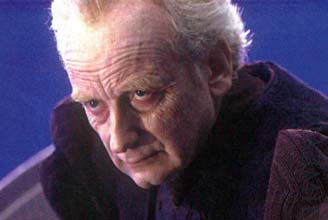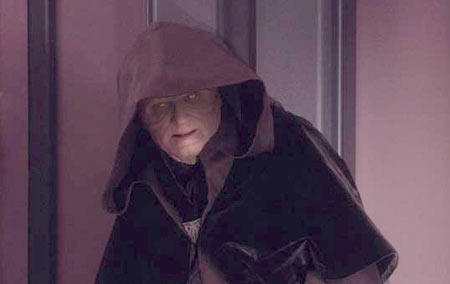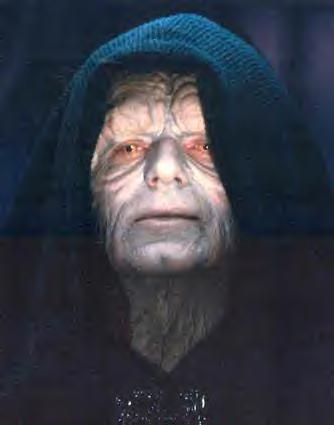Re: \'Revenge of the Sith\' reviews (Spoilers)
To put it succinctly, there are surprises aplenty in Revenge of the Sith, but they mostly concern details. As with Titanic, we're all going into this movie knowing more or less how it ends. Whether the movie's good or not depends entirely on how they get there.
Three word review: George Lucas delivers.
Oh, it's not perfect. There's plenty to be irritated about, but to me, that too was in the details. The overall story was solid and did a fine job meshing the prequel trilogy with the original trilogy, and with a ton of eye candy thrown in just for fun. I know, the film snobs will berate it precisely because of the eye candy, but then they shouldn't go. We've known since 1977 that the visual effects are a major component of these movies, and in Episode III they pull out all of the stops. In fact, I will go out on a limb and declare that with the completion of his saga, George Lucas has created a mythical universe as visually rich as Tolkien's Middle-earth. Don't get me wrong; I'm not talking about depth of story and character, but Lucas has clearly succeeded in creating a fantastic and set of worlds whose existence you can simply accept on sight because the details have been attended to; the austere, empty shopping-mall halls of Cloud City in the theatrical release of The Empire Strikes Back have been atoned for by traffic-filled metropolises, jungles teeming with life, and people on the periphery of the scene having conversations we'll never hear. By showing us that there are things happening in his universe that do not have anything to do with the story at hand, Lucas has made it that much more believable.
Having bashed (as everyone else does) Lucas' hand at writing dialogue and directing actors, I'm happy to report that those things are handled more ably in Episode III. Trust me, they're still the weakest links in the Star Wars chain, but I didn't think they were nearly as laughable as the attempts in Episode II. Hayden Christensen seems to have grown a bit either as an actor in general or as an actor who gets no help from his director except to "do it faster, with more intensity." He takes on the rather difficult task of portraying a man who chooses to do evil, and yet remain sympathetic in some ways. His portrayal allows us to know, as Luke says in Return of the Jedi, that there is still some good in Darth Vader. That's a far cry from the whiny little jerk in Episode II. Natalie Portman is a disappointment; she's a better actor than has been shown in the Star Wars movies, but she doesn't rise above Lucas' mistakes as well as Christensen does. It generally goes without saying, but I'll say it anyway, that Ewan McGregor does a fabulous job as Obi-Wan Kenobi, and that Ian McDiarmid is simply brilliant as Chancellor Palpatine.
Wow. We wanted to see how Darth Vader got that way, and boy, did we. If Lucas has done nothing else right in the prequel trilogy (and some will argue that that's the case), he surpassed my expectations by far in showing Anakin's slow conversion to the dark side. If anything, Lucas has taken some of his disappointments from the earlier movies and built upon them to actually make something work! Specifically, I'm thinking of Anakin's dreams of his mother in Episode II. I hated how all that was handled, and yet in Episode III, it's essential to the plot that we know his dreams come true. His nightmares will drive him to action, and a certain Sith Lord who wants to become Emperor knows it and uses it. By the time Anakin even knows what's going on, he's practically being fitted for the Darth Vader suit. And that's a particularly deep theme for a movie that's so easily dismissed as eye candy: that in contrast to what we thought when we first saw Vader in A New Hope, evil doesn't simply wear a dark cape and announce its presence by choking a helpless space pilot. Evil can be subtle and persuasive, and can bring good people under its thrall and get them to do bad things and still think they're the good guy!
That last bit has gotten a bit of play in the blogosphere, with conservative commentators going nuts over the apparent allegory to current politics. Maybe Lucas is a flaming leftie who thinks Bush wants to be Emperor, maybe he's not; but it's a matter of historical fact that dictatorial regimes have gotten good people to do bad things, and I tend to think that Lucas is going with a thematic truth of human nature rather than a lopsided commentary on current events. Yeah, there's a character who's kinda like bin Laden (but he's also kinda like Mussolini, weak and cowardly and ultimately destroyed), and yeah, there's a "If you're not with me, you're my enemy" line (but Bush wasn't the first to say that), so while I get where the conservatives are coming from --cliches do come from somewhere.
It's particularly disturbing --and intentionally so, no doubt-- that Anakin can still honestly believe he's on the right side after he's killed a bunch of kids just so they wouldn't grow up to be Jedi. Disturbing, but compelling. And far better drama than I'd expect from the guy who saddled the saga with Ewoks.
Just as cool is the revelation that the Jedi really are plotting to depose the Chancellor and take control of the Senate. Sure, they're not doing it out of personal ambition and they do express concern that they're playing with fire in terms of Jedi principles, but it serves to further strengthen Lucas' theme of good and evil looking different depending on your point of view. And mind you, this is not a facile attempt at moral equivalence; the movie does not for a moment suggest that the Jedi are as bad as the Sith --but it does point out that the bad guy isn't wrong 100 percent of the time.
There are disappointments, the biggest being Natalie Portman's aforementioned performance. I know that she's generally a good actor, and I know that Lucas is roundly and correctly criticized for not directing his actors well. But the other cast members pulled it off this time around and she didn't. Her death scene had virtually zero emotional effect on me, and I don't mind telling you I'm not afraid to cry during a movie if it's earned it. Upon reflection, some of that could have been due to the direction and editing, but I don't think so. The scenes were juxtaposed with a crippled Anakin's anguished transformation into the tall guy in the black suit, and those scenes were compelling. I just can't shake the feeling that while the characters were lamenting Padme's loss of her will to live, the truth was that Natalie had lost the will to act.
Most of my other quibbles really are detail-oriented. Lucas did a generally excellent job tying all the loose threads together, but there were some clunkers. One that really stood out as a tacked-on scene was when Yoda commented to Obi-wan that while they were in exile they could learn how to join with the Force and become immortal. What a creaky way to set up for the Obi-wan and Yoda ghosts to be seen later in the saga --especially since there was a better way to do it! Also, while a chapter this dark really did need some comic relief, I think having all the enemy droids sound cartoony wasn't the way to go. Yanked me out of the movie faster than the Gimli-Legolas drinking contest in Return of the King. And the editing of the scene in which Anakin takes the action that puts him on the dark side almost makes it seem like a sudden and unnecessary move for him to take; one moment he's upholding the Jedi principles, and the next he's pledging allegiance to the Sith. The scene has general integrity, but something about it just moves too fast. Finally, we catch a glimpse of the Death Star under construction, and this raises more questions than answers. Does it really take twenty years (the approximate time between Revenge of the Sith and A New Hope) to build one of those things? And if so, how did the Empire almost complete a second one in the six years between A New Hope and Return of the Jedi? No, I think it would have been better to pass up the temptation to show us the Death Star and instead have the Emperor mention that he has a project he wants Lord Vader to oversee that will enable them to keep the new Empire in line. Showing is almost always better than telling, but in this case they showed us something they probably shouldn't have.
But now some good details.
You'll see very, very little Jar Jar Binks. Jar Jar is an easy target, and truth be told, Lucas went a long way toward making up for his presence in Episode I by having him be the moron in Episode II that allows Palpatine to be given emergency dictatorial powers. But ultimately, I believe that the less we see of Jar Jar, the better off we all are. And he's barely in Episode III.
There's a great sequence showing the demise of the Jedi that actually makes sense. The question has always been that if the Jedi are spread throughout the galaxy, how could they be so quickly vanquished? In addition to presenting a solution that is elegant in its simplicity, Lucas frames it well, allowing us to see the tragedy unfold without overdoing it.
I liked the little homage to the old-time serials that Lucas has always maintained he's recreating in Star Wars. One of the clone commanders is named Cody. Once or twice he's actually called Commander Cody. In those old serials, Commando Cody was a helmet-wearing, jet-pack flying hero (he also served as the inspiration for The Rocketeer).
And finally, the fun details, the glimpses of the Star Wars universe that, like the Force, binds the whole thing together. Chewbacca's there, helping Yoda out. If you're looking at the right part of the screen in one scene, you'll see the Millennium Falcon coming in for a landing at Coruscant spaceport. And Grand Moff Tarkin, governor of the Death Star, even makes a cameo. There's a lot of stuff like this, again not really overdone, but ladled out in a thick enough portion to make geeks like me quite happy.













